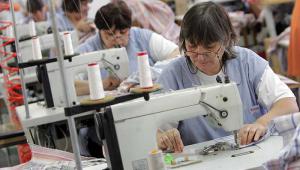web_europeantrade_istock_000038609900_large.jpg

NIESR is the latest institution to warn of the impact any further slowdowns in trade, driven by protectionist policies, could have on growth.
NIESR forecasts that global growth will remain static this year, at just 3% – the same as in 2015 and a rate that NIESR had previously not recorded since the global financial crisis that sent world economic growth plummeting into recession.
Iana Liadze, research fellow at NIESR, noted that even if growth recovers to 3.6% in 2018 as the think-tank expects, it will still fail to match that of the pre-crash period.
NIESR expects growth to return to an upward trajectory next year, with a small increase to 3.2%.
But it warned this remained subject to risks – namely, that there was little scope left to leverage monetary policy to boost growth.
Moreover, further easing could risk financial stability, NIESR warned. Central bank asset purchases are increasingly difficult due to a paucity of suitable assets, and low interest rates leave little ammunition for them to counter a recession if one were to strike.
Liadze stressed that “as long as this situation persists, it will be up to other arms of macroeconomic policy” to allay the effects of future recessions.
NIESR said that the data points to a need for a more balanced policy approach, with fiscal policy playing a greater role. This tactic has also been called for by both the OECD and the International Monetary Fund on numerous occasions.
IMF managing director Christine Lagarde has championed a “three-pronged” approach that makes use of complementary monetary, fiscal and structural measures.
The world’s financial leaders have also spoken out against a rising tide of populist and protectionist policies, with NIESR also delivering a similar warning today.
Certain figures, such as US presidential nominee Donald Trump, are advocating inward-looking economic policies, NIESR highlighted. This comes at a time when global trade – the traditional driver of growth – is expanding at half the average rate of the last three decades, and barely matches global GDP.
In its most recent health check of the global economy, the IMF also emphasised the slowdown in trade, exacerbated by protectionism and a backlash against globalisation driven by runaway inequality, as a key risk to future growth.
“History carries many examples of economic prosperity being stymied by defensive, inward-looking policies, and action to resume progress with international economic integration is vital,” NIESR’s report agreed.
Without a revitalisation in growth, damaging legacies left over from the financial crisis are likely to prevail.
In advanced economies, these manifest as high unemployment, low productivity and inflation, and poor real wages.
In the eurozone, for example, NIESR noted that there has been no progress since the spring in reducing high unemployment.
Even where unemployment is low – notably the US, Japan, Germany and the UK – limited wage pressures “raise questions about the true tightness of labour markets”, NIESR said.
While inflation in the eurozone and Japan is well below desired levels, the US is closer to target and expected to raise interest rates in December – a move with substantial repercussions for the rest of the world.
While NIESR pointed out that the performance in some key emerging markets has improved, with deep recessions in Brazil and Russia easing, elsewhere high levels of debt are sparking fresh concern.
In China, for example, an unsustainable surge in credit has led some prominent groups to warn of the substantial risks posed to financial stability.
Meanwhile, many commodity-based economies have been hard hit by the fall in prices, plunging previously booming African economies like Nigeria and South Africa into or close to a recession. Also, many poorer nations are now unable to service debts built up from heavy borrowing in good times.













